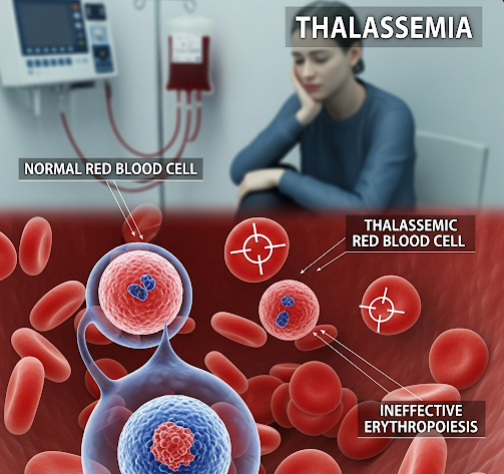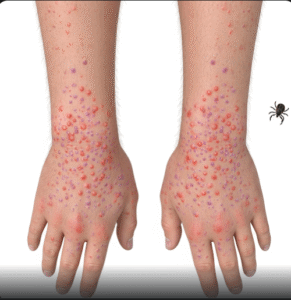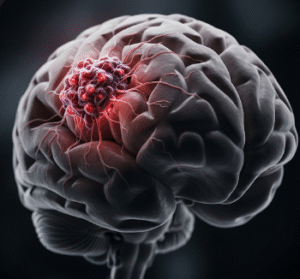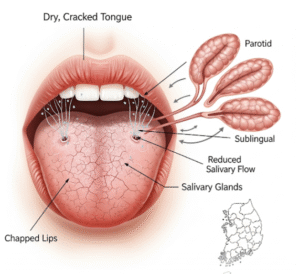Overview
Thalassemia is an inherited blood disorder characterized by abnormal hemoglobin production, leading to reduced oxygen-carrying capacity and chronic anemia. It primarily affects red blood cells, causing fatigue, weakness, and other systemic complications. There are several types of thalassemia, with alpha and beta thalassemia being the most common. South Korea provides advanced diagnostic laboratories, genetic counseling, and comprehensive treatment options, including blood transfusions, iron chelation therapy, and bone marrow transplantation, ensuring effective management and improved quality of life for patients.
What is Thalassemia?
Thalassemia is a genetic disorder caused by mutations in the genes responsible for producing hemoglobin, the protein in red blood cells that carries oxygen. The disorder results in underproduction or abnormal formation of hemoglobin chains, leading to fragile and short-lived red blood cells. This chronic hemolysis and anemia can range from mild to severe, depending on the type and genetic mutation involved. Beta thalassemia major is often life-threatening without treatment, while thalassemia minor may be asymptomatic or cause mild anemia.
Symptoms
The severity of symptoms depends on the type of thalassemia and the degree of anemia. Common symptoms include:
- Fatigue and general weakness
- Pale or yellowish skin (jaundice)
- Slow growth and delayed puberty in children
- Abdominal swelling due to enlarged liver or spleen
- Bone deformities, particularly in the face and skull
- Dark urine from hemolysis
- Shortness of breath and dizziness
- Heart complications in severe, untreated cases
Some individuals with thalassemia minor may not display noticeable symptoms but can still carry the gene mutation and pass it to their children.
Causes
Thalassemia is caused by inherited mutations in the HBA or HBB genes responsible for alpha and beta globin production:
- Beta thalassemia: Mutations in the HBB gene reduce or prevent beta globin chain production.
- Alpha thalassemia: Mutations in the HBA1 or HBA2 genes impair alpha globin chain synthesis.
The disorder is autosomal recessive, meaning a child must inherit defective genes from both parents for the severe form to manifest. Carriers with one defective gene often have mild or no symptoms.
Risk Factors
Factors that increase the likelihood of thalassemia include:
- Family history of thalassemia or carrier status
- Ethnic background: Common in people of Mediterranean, Middle Eastern, Southeast Asian, and African descent
- Consanguineous marriages, which increase the probability of inheriting recessive genes
Complications
Without proper management, thalassemia can lead to multiple complications:
- Severe anemia causing fatigue, weakness, and growth delays
- Iron overload from repeated blood transfusions, affecting the heart, liver, and endocrine glands
- Bone deformities, especially in the face and skull
- Enlarged spleen (splenomegaly) and liver (hepatomegaly)
- Heart failure and arrhythmias in chronic cases
- Increased susceptibility to infections
- Delayed puberty and fertility issues in adolescents and adults
Prevention
While genetic conditions like thalassemia cannot be fully prevented, certain measures help reduce the risk and severity:
- Genetic counseling and screening for at-risk couples before pregnancy
- Prenatal testing to detect severe forms of thalassemia
- Avoiding consanguineous marriages if there is a family history of thalassemia
- Early detection through newborn screening programs
- Awareness programs to educate populations with high carrier prevalence
Treatment Options in Korea
Korea offers comprehensive treatment options for thalassemia, focusing on symptom management, prevention of complications, and curative therapies:
1. Blood Transfusions
- Regular transfusions maintain hemoglobin levels and reduce anemia symptoms.
- Transfusions also suppress the body’s overproduction of abnormal red blood cells.
2. Iron Chelation Therapy
- Frequent blood transfusions can cause iron overload.
- Medications such as deferoxamine or deferasirox help remove excess iron from the body.
3. Medications
- Folic acid supplements support red blood cell production.
- Emerging therapies like gene therapy are under study to correct genetic defects.
4. Bone Marrow or Stem Cell Transplantation
- The only curative option for severe thalassemia.
- Performed in specialized Korean hospitals with high success rates.
5. Supportive Care
- Regular monitoring of hemoglobin, liver, and heart function
- Nutritional support to promote growth and overall health
- Psychological counseling and support groups for patients and families
6. Cost and Hospital Care
Treatment costs in Korea vary depending on severity, frequency of transfusions, and type of intervention. Advanced hematology and oncology centers provide multidisciplinary care, including genetic counseling, transfusion management, iron chelation, and stem cell transplantation. Early diagnosis and structured treatment plans significantly improve patient outcomes and quality of life.













